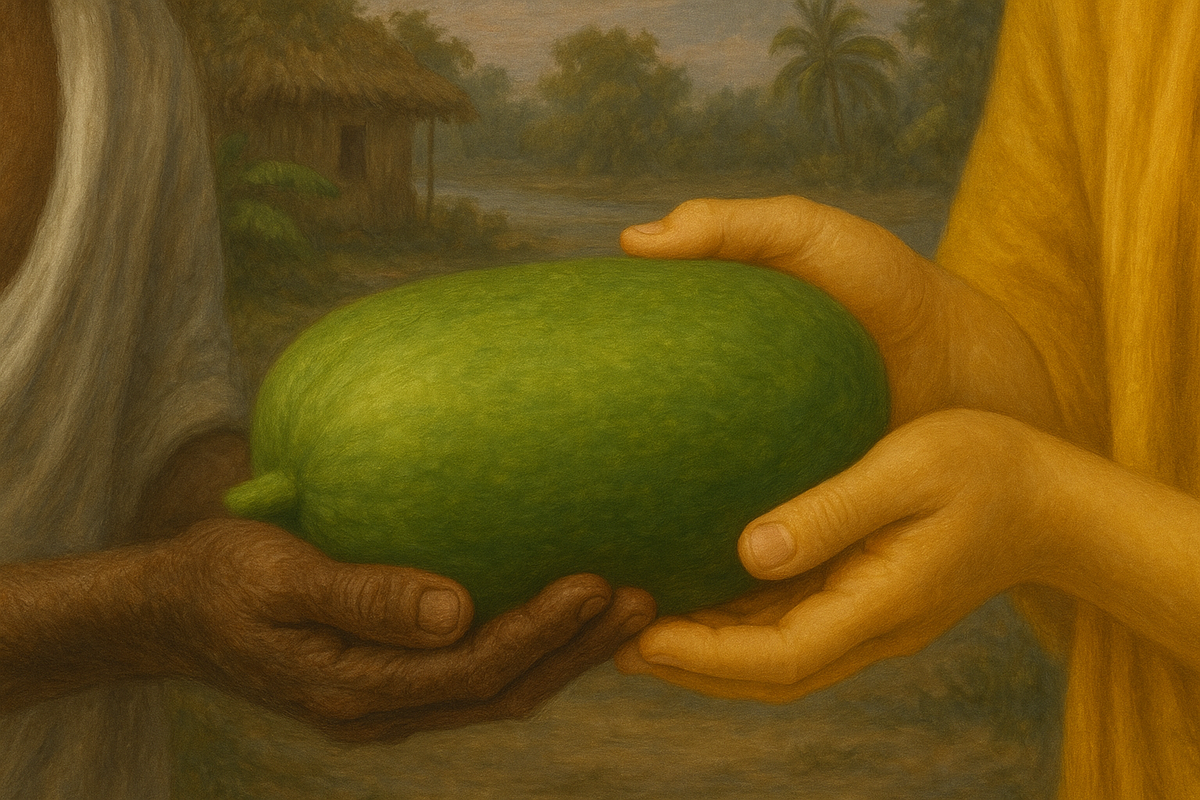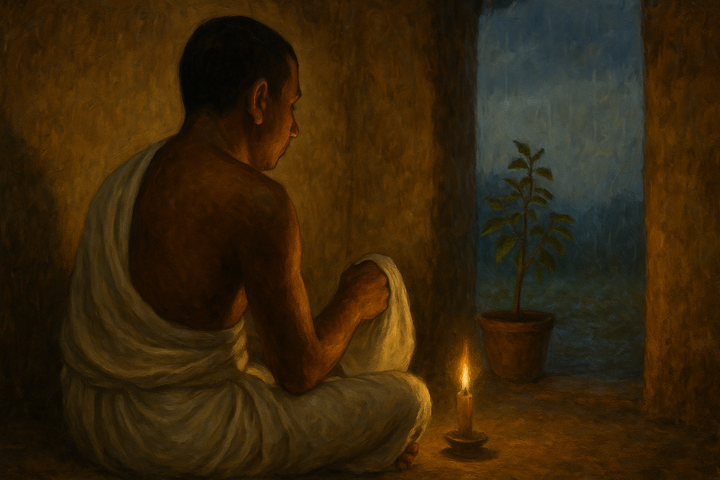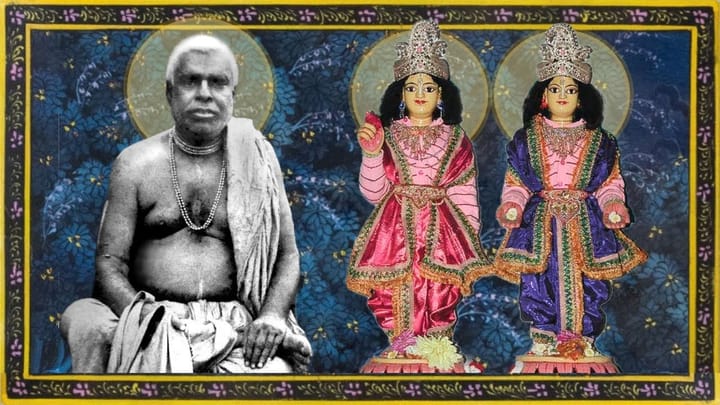Mahāprabhu's Love for the Unseen Devotee (Part Four)

Today, on the auspicious disappearance day of Śrīdhara Paṇḍita, we conclude our series, “Mahāprabhu's Love for the Unseen Devotee.”
The series began in Part One with the sweet quarrels between the Lord and Śrīdhara. It continued in Part Two with the heart-melting pastime where Mahāprabhu revealed His divine form to Śrīdhara, and featured in Part Three the astonishing moment He drank from Śrīdhara's iron waterpot meant only for external use.
Now, in this last section, Part Four, we will see how one of the very last loving exchanges Mahāprabhu had before leaving Navadvīpa to accept sannyāsa was with His dear, humble Śrīdhara.
This day is also the auspicious disappearance day of Mukunda Daṭṭa. As you will read below, Mahāprabhu specifically chose Mukunda as one of only five people to be informed of His secret plan to depart.
Before we begin, let us take a look at the identity of Śrīdhara Paṇḍita from Śrīla Kavi Karṇapura’s Gaura-gaṇoddeśa-dīpikā (133):
kholā-vecatāyā khyātaḥ
paṇḍitaḥ śrīdharo dvijaḥ
āsīd vraje hāsya-karo
yo nāmnā kusumāsavaḥ
"The learned brāhmaṇa Śrīdhara, renowned as the kholā-vecā (banana-bark seller), was known in Vraja by the name Kusumāsava—a cowherd boy who makes Kṛṣṇa laugh [with his playful jokes]."
What follows is a selection of summaries and translated excerpts from Śrī Caitanya-bhāgavata (Madhya-khaṇḍa 28).
On the eve of His departure to accept sannyāsa, Śrī Viśvambhara was deeply immersed in the bliss of saṅkīrtana with His devotees. So captivating was the Lord’s transcendental happiness that His followers completely forgot He was about to leave them. These fortunate devotees were directly relishing pastimes with the Supreme Lord, the very person whom the personified Vedas only hope to see.
On the day He planned to leave, the Lord privately confided in Nityānanda Prabhu. He revealed His firm decision to take sannyāsa on the upcoming Makara-saṅkrānti day (January 14 or 15) from the pure-hearted Keśava Bhāratī, who resided in Katwa. Śrī Gaurāṅga instructed Nityānanda Prabhu to share this secret with only five specific individuals: His mother Śacīdevī, Gadādhara Paṇḍita, Brahmānanda Bhāratī, Śrī Candraśekhara Ācārya, and Mukunda Daṭṭa. Nityānanda Prabhu duly informed these five about the Lord’s imminent departure.
Unaware that the Lord would be leaving that very day, everyone else joyfully spent time in His company. The lotus-eyed Lord, His body adorned with fragrant sandalwood paste and flower garlands, sat at His home surrounded by His followers. An immense and spontaneous crowd of people gathered, drawn by the Lord’s divine attraction. Not even Lord Brahmā could count the number of townspeople who came to see Him. As people arrived, they offered their prostrated obeisances and then fixed their gaze upon the Lord’s beautiful face.
āpana galār mālā sabākāre diyā
ājñā kare prabhu sabe—“kṛṣṇa gāo giyā (25)
Distributing the garlands from His neck to everyone, the Lord gave this instruction: “Go and sing the names of Kṛṣṇa.
“bolo kṛṣṇa, bhajo kṛṣṇa, gāo kṛṣṇa-nāma
kṛṣṇa vinu keho kichu nā bhāviho āna (26)
“Chant ‘Kṛṣṇa,’ worship Kṛṣṇa, sing Kṛṣṇa’s names. Apart from Kṛṣṇa, think of nothing else.
“ĵadi āmā’-prati sneha thāke sabākāra
tabe kṛṣṇa-vyatirikta nā gāibe āra (27)
“If you all have affection for Me, then do not sing about any topic other than Kṛṣṇa.
“ki śayane, ki bhojane, kibā jāgaraṇe
ahar-niśa cinta kṛṣṇa, boloho vadane” (28)
“Be it while resting or eating, or while awake, day and night, just think of Kṛṣṇa, chanting His name with your lips.”
ei mata śubha-dṛṣṭi kari’ sabākāre
upadeśa kahi’ sabe bole—“ĵāo ghare” (29)
Like this, casting His auspicious glance over everyone and giving them this instruction, the Lord said, “Now, go to your homes.”
ei mata kato ĵāya, kato vā āise
keho kāre nāhi cine, ānandete bhāse (30)
In this way, so many came and went. Floating in bliss, no one recognized anyone else.
pūrṇa hailo śrī-vigraha candana-mālāya
candre vā kateka śobhā kahane nā ĵāya (31)
His divine form was covered in sandalwood paste and garlands; His beauty was beyond any comparison to the moon.
prasāda pāiyā sabe haraṣita haĩyā
ucca hari-dhvani sabe ĵāyena kariyā (32)
Receiving His mercy, everyone became joyful and, loudly chanting the name of Hari, they left.
eka lāu hāte kari’ sukṛti śrīdhara
heno·i samaye āsi’ ha·ilā gocara (33)
Just at that moment, the pious Śrīdhara came into view, holding a single bottle-gourd (Bengali: lāu • Hindi: loki) in his hand.
lāu-bheṭa dekhi’ hāse śrī-gaurasundare
“kothāya pāilā?” prabhu jijñāse tāhāre (34)
Seeing the gift of the gourd, Śrī Gaurasundara smiled. “Where did you get this?” the Lord asked him.
nija-mane jāne prabhu “kāli calibāĩya
ei lāu bhojana karite nārilāĩya (35)
The Lord thought to Himself, “I am leaving tomorrow. I will not be able to eat this gourd.
“śrīdharera padārtha ki ha·ibe anyathā
e lāu bhojana āji karibo sarvathā” (36)
“But how can anything from Śrīdhara be otherwise [not honored by Me]? By all means, I must eat this gourd today.”
eteka cintiyā bhakta-vātsalya rākhite
jananīre bolilena randhana karite (37)
Thinking this, and to uphold His own nature of affection for His devotees, He told His mother to cook it.
heno·i samaye āra kono bhāgyavān
dugdha-bheṭa āniyā dilena vidyamāna (38)
Just then, another fortunate soul arrived and offered a pot of milk.
hāsiyā ṭhākura bole—“baḓo bhālo bhālo
dugdha lāu pāka giyā karaho sakāla” (39)
The Lord smiled and said, “This is very, very good! Now please, go and cook this gourd with the milk.”
santoṣe calilā śacī karite randhana
heno bhakta-vatsala śrī-śacīra nandana (40)
With great satisfaction, Śacī-devī went to cook. Such is the affection of Śacī’s son for His devotees.
ei mate mahānande vaikuṇṭha-īśvara
kautuke āchena rātri dvitīya prahara (41)
In this way, the Lord of Vaikuṇṭha blissfully passed the second prahara of the night (roughly 8:30PM till midnight).
sabāre vidāya diyā prabhu viśvambhara
bhojane basilā āsi’ tridaśa-īśvara (42)
After bidding farewell to everyone, Lord Viśvambhara, the master of the thirty[-three million] demigods, came and sat down for His meal.
bhojana kariyā prabhu mukha-śuddhi kari’
calilā śayana-ghare gaurāṅga-śrī-hari (43)
After eating and washing His mouth, Gaurāṅga Śrī Hari went to His bedroom to rest.
After taking the meal prepared from the offerings, Gaurāṅga went to His bedroom and glanced toward mystic sleep, yoga-nidrā (He rested). Gadādhara and Haridāsa also slept nearby. Mother Śacī, knowing that the Lord was about to depart, was unable to sleep and wept continuously.
During the pre-dawn hours of brahma-muhūrta, the Lord awoke, knowing the auspicious time for His departure had arrived. When Gadādhara and Haridāsa also woke, Gadādhara declared, “I will accompany You.” But the Lord replied that He must go alone, stating, “I will have no companion. I am one without a second. This is all My pastime.”
Realizing the moment had come, Mother Śacī went and sat in the doorway. Seeing her, the Lord gently took her hands and began to offer words of solace:
“You have nurtured Me with such immense care. All my studies and all I have learned have been because of you. For yourself, you never took even a sesame-seed’s worth of happiness; from the day I was born, you have only ever increased My own comforts and joys. The love you have showered upon me, moment by moment, is a debt I could not hope to repay in millions of lifetimes. Only by your grace could that debt ever be settled, yet even then, birth after birth, I would remain indebted to you. Listen, Mother, this entire world moves according to the will of the Supreme Lord; no one has the power to be independent of Him. All meetings and all separations are arranged by that Lord. Who possesses the power to truly understand His desire? So whether I leave this place now or in ten days' time, please do not fill your heart with anxiety. All of your needs—worldly and spiritual—are now my charge. The entire burden is mine.”
Placing His hand upon her heart, the Lord declared again and again, ‘The entire burden of your care is Mine, and Mine alone.’ ”
Mother Śacī listened quietly to all He said, but she could not reply, shedding incessant tears. In her silent gravity, she became like Mother Earth herself.
Finally, the Lord took the dust of His mother’s feet upon His head, circumambulated her, and immediately departed. In this way, the Lord of Vaikuṇṭha left His home to accept the renounced order of sannyāsa for the ultimate purpose of delivering all the fallen souls.



Comments ()